THIS POST CONTAINTS SPOILERS FROM THE MOVIE DETECTIVE BRUNO
After The Black Mill comes Detective Bruno, a second film produced through my collaboration with Mariusz Palej. This time, however, the movie was directed by a duo, with Magdalena Nieć as co-director. Magdalena had appeared on screen before, most notably in her role as the mother in The Black Mill (She was also responsible for casting roles and acted as second director in the 2020 movie).
The Beginning
I had heard about the story of Bruno and the fantastic script by Marcin Ciastoń and Ewa Rozenbajgier long before any music work began. Detective Bruno tells the story of eight-year-old Oskar, who lives with a foster family. The boy is trying to solve a mystery and find the last gift his parents had left for him. In his quest to find the lost item, he is helped by Bruno, the actor starring in a popular TV show called (surprise) “Detective Bruno”. As it turns out, the brave detective and hero figure is in fact a cynical actor struggling with an image crisis.
I couldn’t get over my surprise when I found out that Magdalena Nieć and Mariusz Palej, my recent collaborators on The Black Mill, were responsible for the film adaptation of this family comedy. I was excited because I felt the movie needed this sort of music that I`ve never done before. After initial discussions, we agreed that I would write mockups for a selection of scenes and describe my soundtrack idea in a few words. To my delight, they loved the demo and work was soon underway.
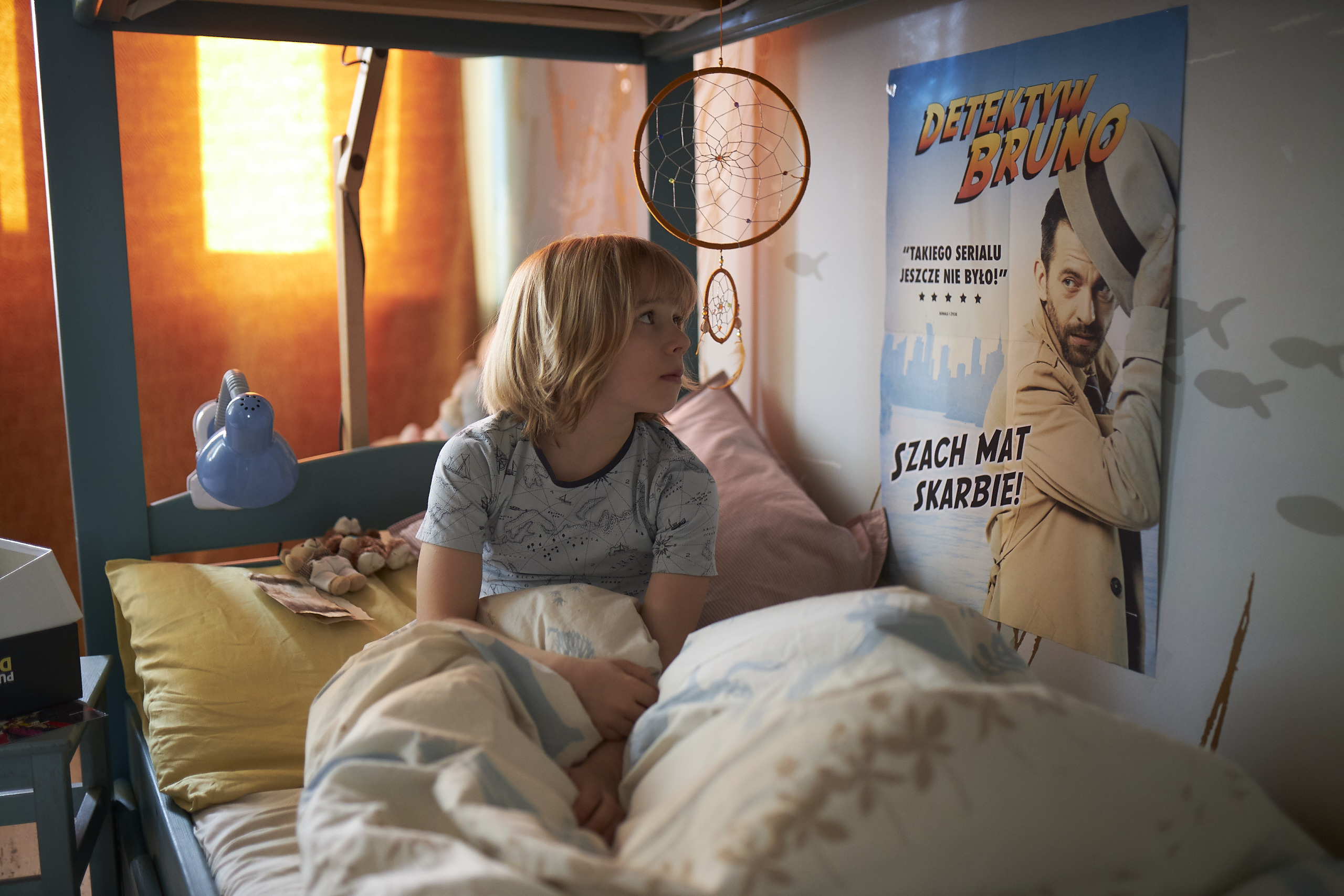
Fot. Maciej Skwara
Action Plan
I’m not the most patient person in the world, but whenever I get a first edit version of a film, I make sure I’ve seen all of it at least twice (often at least three times) before I start working on it – it’s really not easy, as I’d most like to start writing straight away! I`ve found that an initial sense of the film’s pace and emotion is extremely important and saves you a lot of blundering later on. When working with Mariusz, we don’t use any temptracks or even reference music. The initial spotting takes the form of a casual conversation with the directors about the film and the key themes – the points where music should start playing and musical narrative are honed only after I send in some solid proposals – that’s why I need to have a good action plan to begin with.
Working on a soundtrack is always some form of ‘world-building’, which is probably my favourite term for the music-writing process. What is this world supposed to be like? Full of guitars and the warm rustle of nylon strings? Full of cold, eerie violins? How do I convey sadness? Or joy? What do I need to underline ? These are just a few of the endless fascinating questions I have to answer each time. At the end of the day, few things give me such wonderful satisfaction as a beautifully created world!
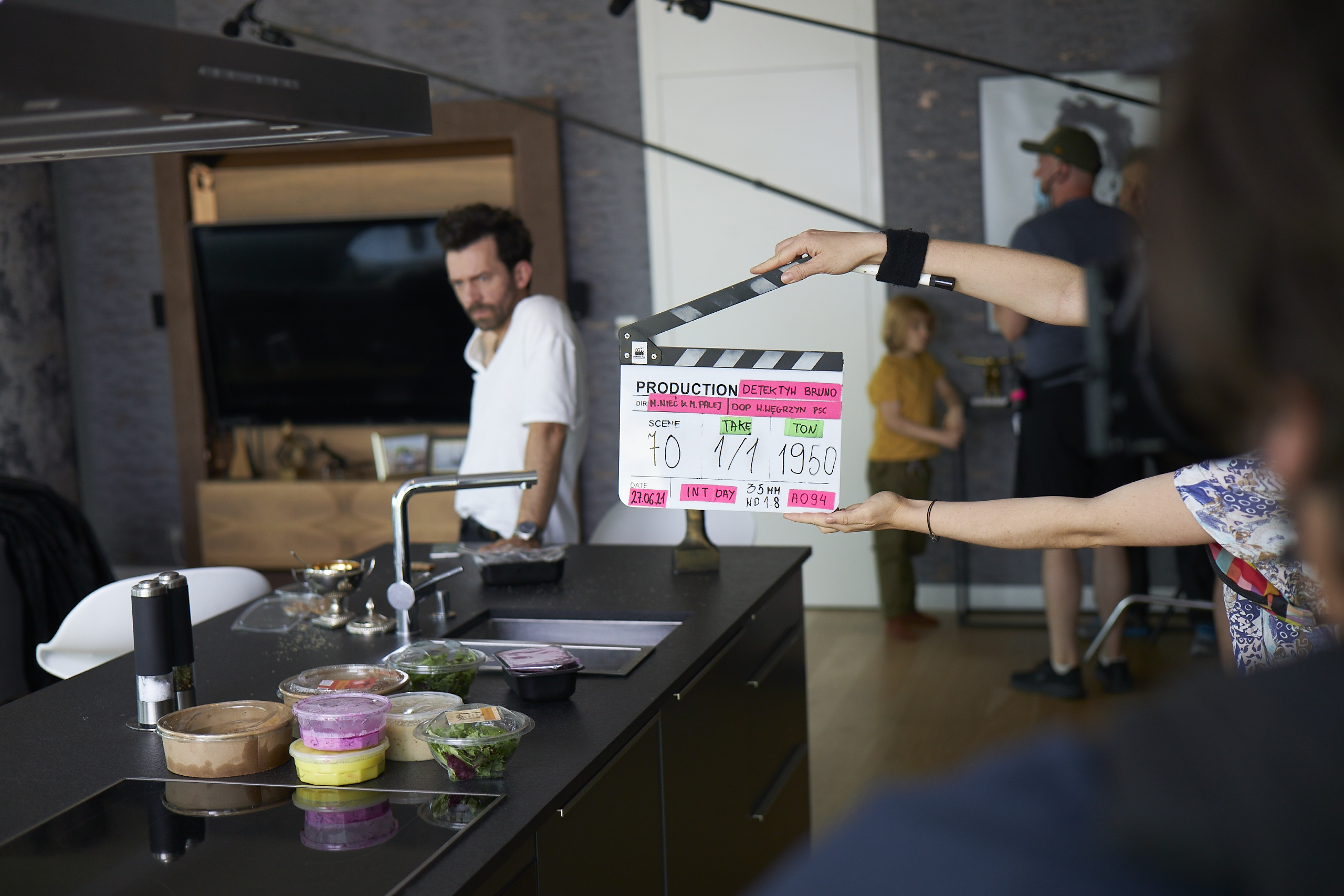
Fot. Maciej Skwara
Detective Bruno… on the beach.
The idea for the musical world in Detective Bruno came quite quickly; I was inspired by one of the first scenes – the shot in which Bruno ‘knocks over’ a boy on the set. In the background, we then see a typical film studio from behind the scenes with the crew bustling around and bits of set design – a plastic shark, sand, a deck chair and palm trees – all bathed in artificial warm light. Watching this scene, I realised how many shots in that location in the film revolved around the colours blue and yellow. This is an extremely interesting approach, giving the whole story a positive, holiday-ish feel – after all, these colours make us think of rest and relaxing days on a sunny beach. I was trying to figure out how to mix in this idea of a ‘sunny beach’ into the music and then it occurred to me… surf rock! I found this though extremely interesting – a bit crazy perhaps (after all, the whole plot takes place in Warsaw), but also unique. Surf rock was therefore my first world-building block.
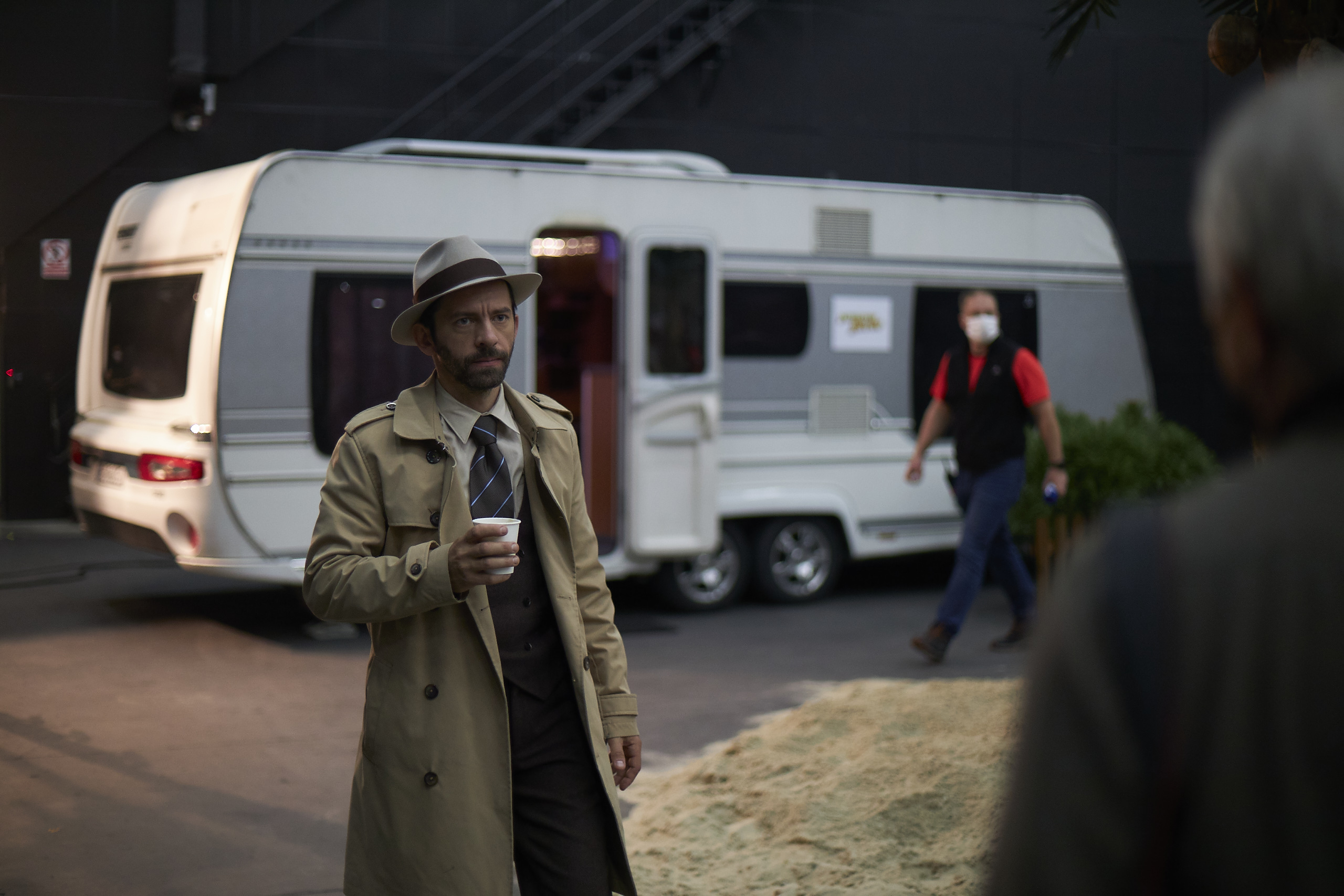
Fot. Maciej Skwara
The second was little Oskar’s vivid imagination, seeing a world that sparkles with colours and dreams. I wanted the music to reflect this richness through the intensity and multiplicity of the music timbres used. And so in the Zoo we hear the marimba, the elephant has its own majestic theme (which adult would write a separate theme for an elephant appears on the screen for all of 30 seconds?), the prop room is a magical and mysterious place and the series’ duelling scenes… full of terror and delight. The music looks at the world through the eyes of a child.
This multi-coloured world of imagination has its sad counterpoint in the film, as the death of the boy’s parents is slowly revealed in a major plot twist. I really wanted the music at that point to allow the viewer to relive the experience together with the characters. There’s no denying that this musical setting creates a mood of sadness and pain – but it does so in a subtle, controlled way. This is a very important place in the film, because if the viewer does not experience the loss of parents together with Oskar, it will definitely take the emotional edge off the subsequent reconciliation of the characters and the film’s overall happy ending.
The Process
The music for “Detective Bruno” was written very quickly due to busy schedules – all January, we had daily Zoom meetings with the directors to talk, exchange ideas and experiment. I have very fond memories of this project – you could basically say that the evening talks were for Magdalena, Marcin and me a sort of January ritual.
The work was so intense that the day before the recordings I was still rewriting the second part of the Oskar and Bruno theme at 2:30 in the morning. Sometimes it’s at the most difficult moment, when you’ve been sitting in the studio for 16 hours and really have no strength left, that the best ideas come (but let’s be honest – sometimes they don’t) – fortunately, I’m really proud of this particular tune. At the end of the day, I got home at 4 a.m., packed my bags and took the train to Warsaw for recording session.
We recorded in the S7 studio for a whole day with Blażej Domański and some absolutely brilliant musicians:
Mateusz Smoczyński Lucjan Szaliński-Bałwas oraz Michał Sikorski
violin
Krzysztof Lenczowski
cello
Henryk Kowalewicz
french horn
Mateusz Żurawski
oboe
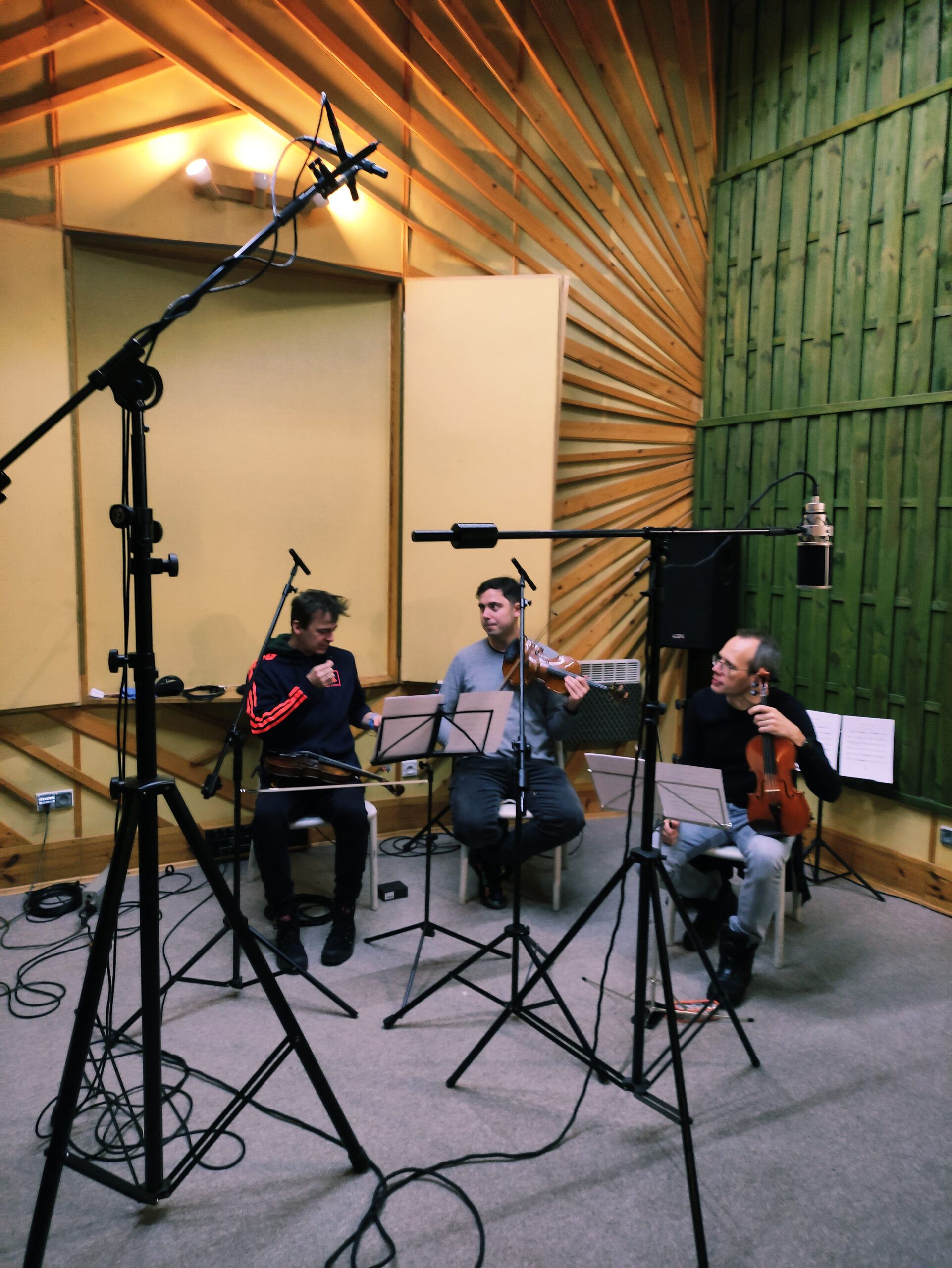
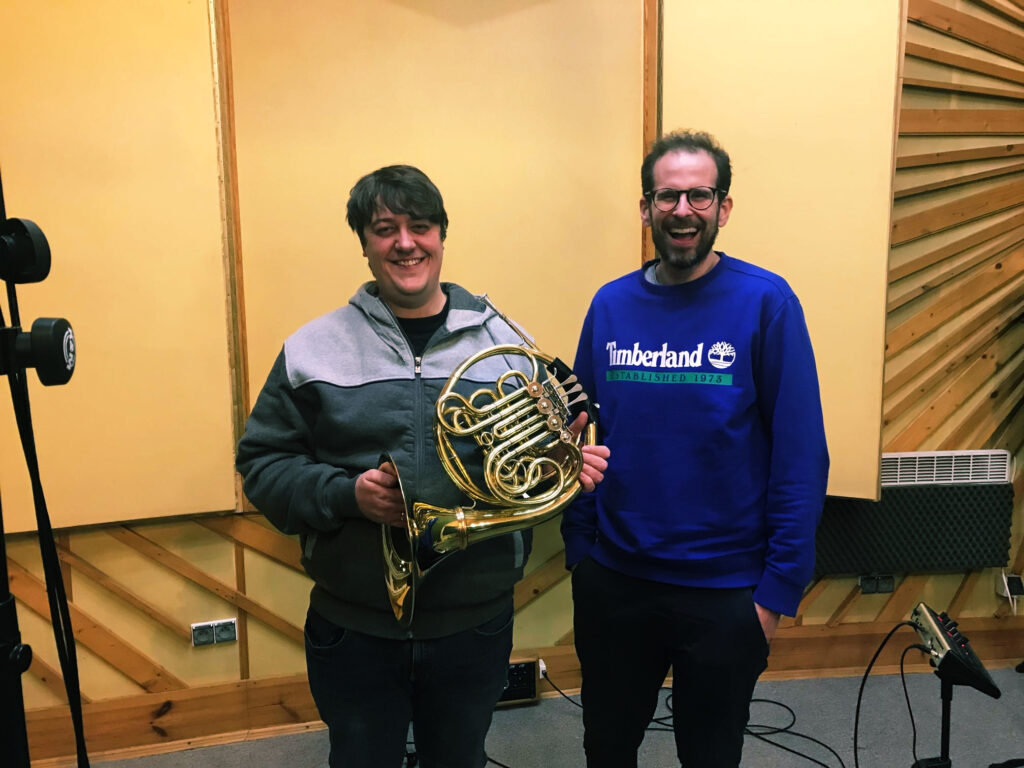
There was a lot of material, but with such incredibly skilful and talented performers, we managed to do everything according to plan. Last not least, I invited Olek Grochocki, a guitarist with whom I had the pleasure of working on Etgar Keret’s A Brief History of Us, to collaborate. In addition to the ‘Tele’ sound (surf rock, remember?), Olek contributed solos, classical guitar and a lot of acoustic parts.
Themes
There are a lot of different themes and motifs in the score for Detective Bruno, and here I have decided to list just a few major ones.
Oskar & Bruno
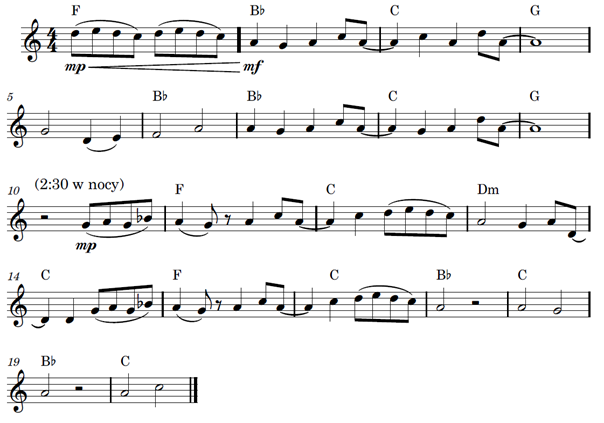
TV Show Detective Bruno

Friends
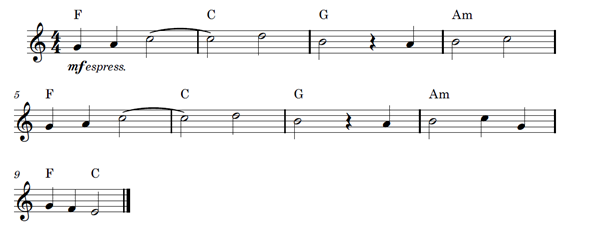
A few words at the end
Detective Bruno is the film I worked on after two electronics-laden projects – The Black Mill and Wartime Portraits 2: Women. It was a huge change stylistically and emotionally (especially compared to the latter one) – I have to admit that I enormously appreciate such changes, and being in the colourful world of Oskar was a great adventure for me!
At this point I would also like to thank Mariusz and Magdalena and the wonderful Shipsboy team – Joanna Szymańska, Krystyna Kantor, Monika Łuczyk. I’d like to thank my assistant Stanisław for working with me through the night, as well as Bartosz Bednarz / Postnovation for great post-production management. Last but not least, Marika Koasidis from Uszy.Te for keeping an eye on everything.
– Maciek